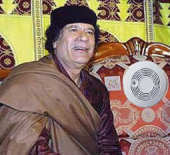 Six months after the State Department removed Libya from the list of state sponsors of terrorism, the Nuclear Regulatory Commission got around to changing its regulations to reflect this removal. In a Federal Register notice issued Friday the NRC amended its rules and changed Libya’s status from an “embargoed country” under 10 C.F.R. § 110.28 to a “restricted country” under 10 C.F.R. § 110.29.
Six months after the State Department removed Libya from the list of state sponsors of terrorism, the Nuclear Regulatory Commission got around to changing its regulations to reflect this removal. In a Federal Register notice issued Friday the NRC amended its rules and changed Libya’s status from an “embargoed country” under 10 C.F.R. § 110.28 to a “restricted country” under 10 C.F.R. § 110.29.
The effect of that designation is that certain nuclear materials for which general export licenses are available under NRC rules may now be used to export those materials to Libya. For example, small quantities of americium-241 may now be exported to Libya under the general license provided in § 110.23.
Although exporting americium-241 sounds rather sinister, you should realize that small amounts of americium-241 are used in certain industrial applications such as equipment used to measure the rate of production of oil wells. Tiny amounts (less than 37 kBq) of americium-241 are also used in the ionization chambers of many residential and commercial smoke detectors. Ionization smoke detectors are, in fact, the principal use of americium-241.
People in Tripoli, however, shouldn’t expect to be getting American smoke detectors anytime soon. Under § 110.23 americium-241 can be exported under the general license to restricted countries such as Libya only when “contained in industrial process control equipment or petroleum exploration equipment.” I suppose we are still concerned that Qaddafi might dismantle a hundred million or so smoke detectors, extract the americium-241 and make a dirty bomb or two.
I suppose I should acknowledge that a terrorist cell that couldn’t shoot straight did try to make a dirty bomb from smoke detectors. A recently declassified intelligence report to Congress contained this statement:
British authorities announced the August 2004 arrest of members of an Islamic terrorist cell in the UK that may have attempted to produce an RDD [radiation dispersal device] using a radioactive isotope of americium taken from smoke detectors. The knowledge base and competence of this cell was low.
Uh, yeah. Do the math on how many smoke detectors it would take, at 37 kBq of americium-241 per smoke detector, to make a useful dirty bomb and saying that the competence of this cell was low is an understatement.
 Permalink
Permalink
Copyright © 2007 Clif Burns. All Rights Reserved.
(No republication, syndication or use permitted without my consent.)

 Posted by
Posted by  Category:
Category: 

